Olympic Karate Medalist Slams Iran's Ban On Competing With Israelis
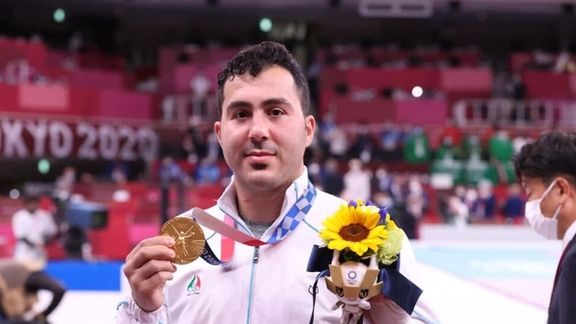
Iranian karate champion Sajjad Ganjzadeh has criticized the Islamic Republic for not allowing athletes to play sports matches against Israeli competitors.

Iranian karate champion Sajjad Ganjzadeh has criticized the Islamic Republic for not allowing athletes to play sports matches against Israeli competitors.
Ganjzadeh said in an Instagram post on Monday that such an approach forces athletes to only attend Asian competitions, in which Israel does not participate.
Urging the authorities not to consider only political issues and their ideological position, the Olympics gold medalist said, "We cannot tolerate this anymore. Not competing is more difficult than competing”.
Iran is a sworn enemy of Israel, calling for its destruction and prohibits sportspeople from playing against Israeli competitors. There is no legislation banning athletes but under pressure from federation officials, they usually lose games intentionally, forfeit matches or claim injury to avoid facing Israelis.
Supreme Leader Ali Khamenei has often praised Iranian athletes who refuse to play against Israelis, and in September 2021 said they should continue to do so even if facing punishment by international sports bodies.
About 30 Iranian athletes in recent years have defected from Iranian national teams and sought asylum in other countries, including Judo champion Saeid Mollaei, Greco-Roman national team wrestler Ali Arsalan, and many others.
Mollaei defected to Mongolia in 2019 after reportedly losing a fight to avoid Israel's Sagi Muki. As a result of the Mollaei case, the International Judo Federation in April 2021 banned Iran's judo teams from international competitions for four years. At the 2020 Tokyo Olympics, Mollaei won a silver medal competing under the Mongolian flag.
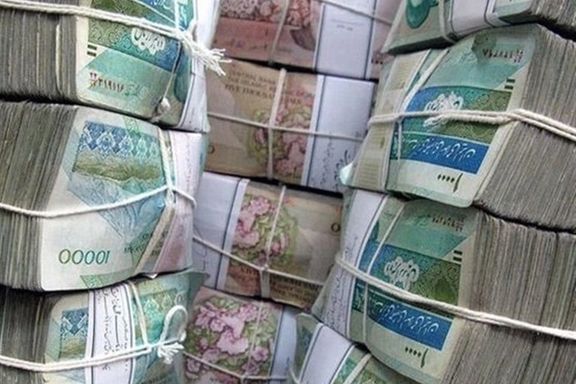
Iran’s liquidity grew by 40 percent from early 2021 to 2022, according to its central bank, as the country continued to print money amid a revenue crunch.
The amount of cash in the economy was more than 3 quadrillion rials (15 zeros) 14 months ago and jumped to 4.6 quadrillion in February this year. In US dollars the amount might not seem staggering, reaching almost $200 billion, only because the rial has fallen more than eightfold against the dollar in the past four years.
The first six months of this period covers the former Rouhani administration and the next six months the presidency of conservative cleric Ebrahim Raisi, who pledged to control liquidity and inflation during his presidential campaign last June.
But little seems to have improved since August when Raisi took office. Inflation continues at the annual rate of more than 40 percent, while prices of food and other essential goods are rising even faster.
The Raisi administration so far says it is trying to deal with the damage done by the previous government, but people and politicians are increasingly skeptical, saying eight months was ample time for the new president to make a difference.
A breakdown of the Iran’s central bank (CBI) numbers issued on Monday shows that almost half of the increase in liquidity occurred since early August, debunking Raisi’s claim that his government has restricted borrowing from the CBI.
The borrowing continued as the government claimed oil exports increased by 40 percent since August, and presumably its foreign currency revenues also jumped. Oil minister Javad Owji announced on Tuesday that in the past 12 months Iran exported $43 billion of crude oil and derivatives. That is almost double of what was sold in the previous year.
Politicians and media ask where is the impact of the additional government income? Why the currency stays low, and inflation continues at the same rate.
The Raisi administration and its supporters say that the government has been repaying debts incurred during Rouhani’s presidency, but it all does not make sense if liquidity is increasing. One official said that since August the government has spent $400 million a month to repay borrowings by the former administration. A Raisi supporter in parliament said on Tuesday that the Rouhani government printed money against unrealized foreign currency income, thus fueling liquidity and inflation. He was referring to Iran’s funds blocked abroad because of US sanctions.
Rouhani’s central bank chief, Abdolnaser Hemmati has challenged Raisi’s officials to a public debate to rebuttal their accusations.
As the government and the parliament struggle to tell the public that the situation will improve, few public figures dare to openly say that Iran’s economic problems cannot be solved without first reaching an agreement with the United States and lifting oil export and banking sanctions.
Negotiations in Vienna have stopped since March, but the main decision maker in the country, Supreme Leader Ali Khamenei insists Iran can solve its economic issue independent of the nuclear talks.
Oil minister Owji also said on Tuesday that only the country’s natural gas sector needs an infusion of $80 billion to be able to increase falling production. In November, he had announced that the oil and gas sector needed $160 billion to retool and rejuvenate itself.
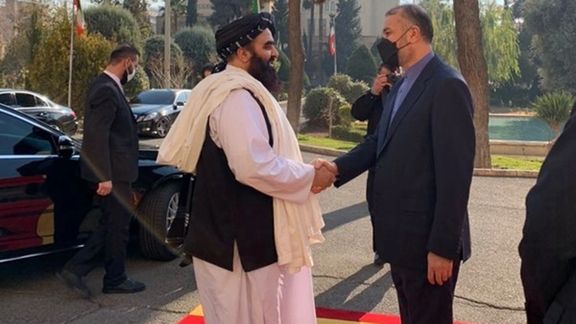
Taliban's acting foreign minister and his Iranian counterpart have held a phone conversation about recent tensions between the two countries.
In the phone call late on Monday, Afghan foreign minister Amir Khan Muttaqi said a Taliban delegation will soon visit Iran to discuss the situation of a growing number of Afghan refugees living in the country and those jailed in Iranian prisons.
According to a statement by the Afghan foreign ministry, the two sides also expressed determination to expand cooperation, noting that some groups are using media to sow discord between the two countries and pave the ground for violence.
Tensions are high between the two countries, especially after Afghan protesters attacked the Iranian consulate in Herat Monday hurling stones, smashing security cameras, and burning tires before they were dispersed by Taliban security. People also held a demonstration outside Iran’s embassy in Kabul over alleged mistreatment of Afghan immigrants in Iran.
Following the attacks, an Iranian-backed group organized a gathering in front of Tehran’s embassy in Kabul to express support for the Islamic Republic, but Taliban forces closed its center in Kabul and arrested several people who were connected to it in Herat.
Iranian media’s account of the telephone call said that Muttaqi had assured Tehran of full security for Iranian diplomatic facilities, diplomats and staff in Afghanistan.
Tehran says it will not resume its consular services before receiving assurances from Afghan authorities over protection of its diplomatic missions in Afghanistan.
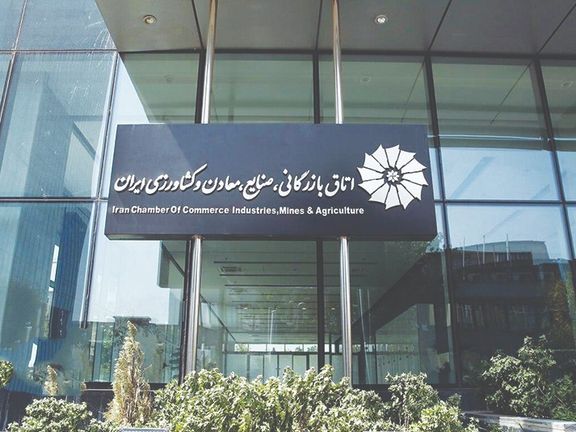
Iran's parliament has approved a plan to investigate reports about the disappearance of 15 trillion rials – around $60 million – in Iran’s Chamber of Commerce.
The parliament gave the go-ahead in its Tuesday session with 190 votes in favor of the move that will probe the transactions of the Iranian Chamber of Commerce, Industries, Mines and Agriculture (Iran Chamber) during the past 10 years. The Chamber is a quasi-state entity.
On Saturday, the conservative Farhikhtegan newspaper alleged that a review of documents related to the payments of 40 companies to the Chamber in the last four years indicates that a huge amount of money is not accounted for in the institution’s ledger.
In one case, the Chadormalu Mining and Industrial Company was supposed to pay the chamber about 900 billion rials but data show that only 30 billion– about one-thirtieth – was actually paid.
The chairman of the Chamber Masoud Khansari said on Tuesday that the reports are not based on accurate numbers and the Judiciary should investigate where such figures came from, describing the report as a blow to the government.
Earlier in April, the general director of a major government pension fund said that around $400 million was lost either through mismanagement or embezzlement.
Iran ranked 150 out of 180 countries in the 2021 Corruption Perceptions Index (CPI), one step lower than the previous year, which weakens its struggling economy.
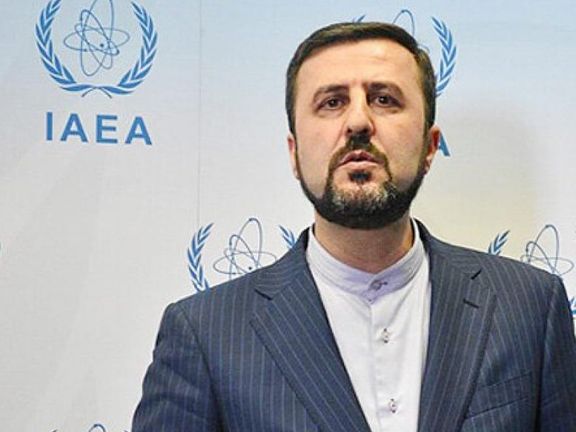
A senior Iranian human rights official has alleged Sweden is morphing into a prison for Muslims with the support of its government.
In a post on his twitter page on Tuesday, Kazem Gharibabadi, a senior Judiciary official and secretary of Iran’s High Council for Human Rights, claimed there is religious intolerance in Europe, particularly in Sweden.
Noting that “Religious intolerance is raging across Europe”, he said, “Sacrilege to religious sanctities is under no circumstances whatsoever acceptable”.
“Seems they’ve missed Medieval Inquisition!”, he quipped.
The Islamic Republic has been long accused by United Nations experts and human rights organizations of persecuting religious minorities.
On Sunday, Iran’s Foreign Ministry summonedthe Swedish chargé d'affaires to protest the burning of a Quran in Sweden by Rasmus Paludan, the leader of Danish far-right political party Stram Kurs (Hard Line).
Paludan went to an open public space in a heavily Muslim-populated neighborhood on Thursday, put the Quran down on the ground and burned it while ignoring protests from onlookers.
Since Thursday, several cities across Sweden, such as the Stockholm suburb of Rinkeby as well as in the cities -- were scenes of riots by Muslims and violent clashes, with social media videos showing young men smashing windows of police cars and setting them on fire.
Several people from pro-Paludan protesters and counter-protesters as well as police forces have been injured and dozens of arrests were made by the Swedish police that seems to be struggling to control the unrest.

The cost of internet subscription in Iran has gone up by up to 60 percent, limiting access to information and potentially harming million of online businesses..
Internet providers recently increased the cost of their services by between 60 to 100 percent. According to Tehran Municipality's Hamshahri newspaper, only days after the hike in the price of broadband, mobile operators scrapped all six and 12-month subscription packages and have only more expensive 90-day packages on offer now.
The subscription cost increase comes at a time when inflation is around 40 percent and food prices have risen by more than 60 percent in one year. The budget of fixed-income Iranians is stretched thin and many have cut down even on food purchases.
Last summer during his election campaign, President Ebrahim Raisi said his government would make broadband free to lower income families but so far has not delivered on the promise. His telecommunications minister, Eisa Zarepour, on March 22 promised adjustments to the cost of broadband would be done with consideration so that it would not add pressure to the other pressures people were under due to the high inflation.
Many also complain that despite higher costs, the speed of broadband has also gone down. Zarepour on Monday admitted that broadband speed in Iran is low due to lack of infrastructure development in the past few years. Iran ranks between 140 to 150 in broadband speed and 70 to 80 in mobile internet speed globally, he said.
Most Iranians use mobile internet rather than broadband. According to the latest figures published by the government, there are 10.6 million broadband and 84.1 million mobile internet subscribers.
Around 1.7 million small businesses, employing 7-8 million people, rely on online commerce, which can decline if internet subscriptions or usage decline.
Some Iranian media, such as conservative Entekhab, have alleged that the hike in the cost of access to the internet may be an attempt to reduce people's access to the internet. Entekhab called the hike the "silent implementation" of Siyanat (Protection) bill. The controversial bill, ironically titled Legislation to Protect Cyberspace Users’ Rights, critics say, is meant to enforce restrictions on the internet and foreign social media platforms.
If passed, the legislation currently under review would require foreign and domestic social-media networks and messaging applications to register with a regulatory and supervisory body that would include representatives of intelligence organizations. The ministry of communications and information technology would be charged with blocking any social networks or messaging applications that failed to gain approval.
Hardliners are adamant the bill should pass the parliament. Ahmad Alamolhoda, a senior firebrand cleric who is Supreme Leader Ali Khamenei's representative in Khorasan-e Razavi Province, on April 8 strongly criticized the parliament for delaying the approval of the controversial bill. "The enemy is at our throat [on social media] and you constantly dilly-dally. What are you waiting for?" he said in his Friday prayer sermon.
Some of the bill’s supporters argue Iran should emulate China's in creating a national intranet. "The Chinese have unique and innovative experience in this field, which we can put to use," lawmaker Ali Yazdikhah said January 18. China uses its ‘Great Firewall,’ a fortified digital border, to manage access to information entering and exiting the country through the Internet.
Iran has been heavily restricting access to the Internet for the past 20 years. Many foreign and Iranian websites, including media websites, are already blocked in Iran although controls are readily sidestepped by VPNs (virtual private networks) and anti-filtering software. While Instagram is the only major social-media platform not blocked in Iran, millions of Iranians use Facebook, Twitter, YouTube, and WhatsApp.